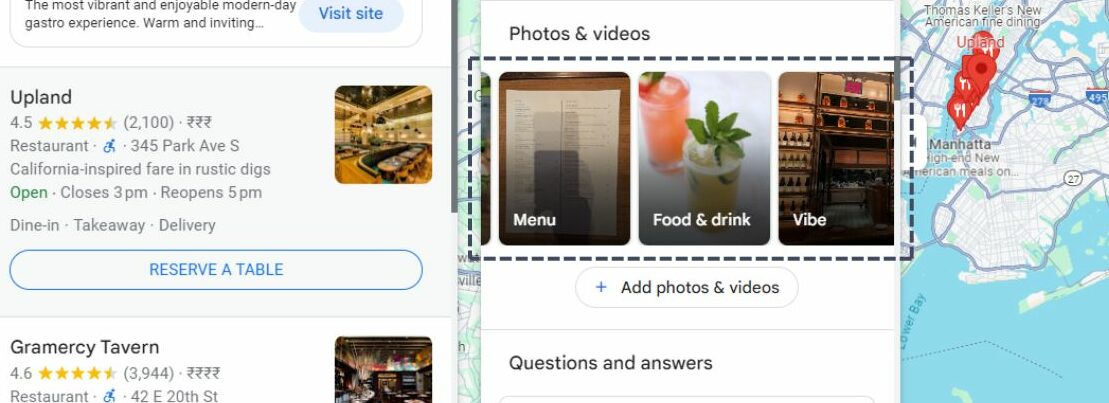Table of Contents
Staying relevant in this cut-throat world and grabbing viewers attention can be tiresome. For enhancing your reach to more potential customers, local SEO for restaurants can be that secret ingredient. Whether you’re a cozy cafe or a fine dining establishment, mastering SEO marketing restaurants can significantly impact your bottom line. Let’s dive into the processes and factors involved in improving your restaurant SEO and rank your business high on near me searches.
The Recipe for Success: Understanding Local SEO for Restaurants

Simply put, restaurant search engine optimization is a puzzle that if solved, will bring success to your business and be a major part in your ranking factors. It is all about optimizing your online presence to attract nearby diners. It’s like creating the perfect dish – you need the right ingredients and techniques to make it irresistible to your target audience.
What is Local SEO and Why It’s Crucial for Your Restaurant
Let’s get back to the starting line and answer the question, “What exactly is Local SEO?”
Surfing your way through multiple marketing guides, you might have come across the word ‘local SEO’. It is, in short, the key factor in marketing that pushes your visibility in order to get noticed by potential customers.
Now that we have got an idea of what local SEO is, let’s understand why it is important for your restaurant. Imagine when someone searches for “best pizza near me” or “Italian restaurant in [city name],” you want your restaurant to pop up at the top of the results. According to a research by Google, 76% of people who conduct a local search on their smartphone visit a physical place within 24 hours and 28% of those searches result in a purchase. Now you have got the gist of how deeply local SEO for restaurants is affecting returns of your business. It’s about being the first choice when hunger strikes in your area.
The Impact of SEO Marketing for Restaurants on Customer Acquisition and Revenue
Effective restaurant search engine optimization can not only influence your restaurant’s reach and number of customers, it is also capable in:
- Attracting more foot traffic
- Increasing online orders
- Growing customer engagement
- Improving brand recognition
According to a study by Semrush, 46% of search users use search engines as their primary way to find local businesses. That’s a lot of potential customers you could be reaching with the right restaurant SEO strategy.
Setting the Table: Essential Local SEO Marketing for Restaurants
Now that we have a grasp of how local SEO is important for your restaurant, let’s dive in deeper and comprehend the key strategies that will help your restaurant climb the search engine rankings.
Optimizing Your Google My Business Profile
Your Google My Business (GMB) profile is like your restaurant’s digital storefront. It’s often the first thing potential customers see when they search for you or related keywords. Here’s how to make it shine:
- Claim and verify your GMB listing
- Provide accurate and up-to-date information (hours, location, contact details)
- Add high-quality photos of your restaurant and dishes
- Regularly post updates, special offers, and events
- Encourage and respond to customer reviews
An optimized Google My Business profile requires proper guidance and detailed steps that will boost your local SEO presence.
Crafting a Mobile-Friendly Website Experience
As per a research conducted by Statista, 82% of the US population use their mobile devices to search for local businesses. With that high statistics in line, having a mobile friendly website is non-negotiable. Make sure your site:
- Loads quickly (aim for under 3 seconds)
- Is easy to navigate on smaller screens
- Has a click-to-call button for easy reservations
- Displays your menu in a mobile-friendly format
Implementing Schema Markup for Rich Snippets
Schema Markup is giving search engines a bowl of information about your restaurant. This helps search engines understand your business better and display your content more effectively. Schema markup are used for:
- Storing restaurant information (type of cuisine, price range, etc.)
- Menu items
- Reviews and ratings
- Events and special offers
The Main Course: Keyword Strategy for Culinary Businesses
Effective keywords can highly influence your restaurant search engine optimization strategy. In order to push your website high in local search ranking, keyword-rich content is a must.
Following tips can assist your website rank high in local search results.
Researching Local and Culinary-Specific Keywords
Keywords play an important role in pushing your website to relevant audiences. However, choosing the right keywords that match with your business is crucial. Ahrefs own statistics claim that 94.74% of keywords get 10 monthly searches or fewer. Search for keywords that matches with your restaurant’s features such as:
- Your cuisine type (e.g., “Italian restaurant in [city]”)
- Signature dishes (e.g., “best wood-fired pizza in [neighborhood]”)
- Local landmarks or attractions near your restaurant
Use tools like Google Keyword Planner or SEMrush to find relevant keywords with good search volume and low competition.
Integrating Keywords Naturally in Your Website Content
Any engaging content that captures viewers attention is likely to be smooth and not forced. Try to avoid stuffing keywords in your content and integrate naturally with the flow. In your words, try sprinkling them throughout your websites like seasoning on a dish. Place them on your:
- Page titles and meta descriptions
- Headers and subheaders
- Menu descriptions
- Blog posts and articles about your restaurant or cuisine
Remember, the key is to use keywords naturally. Don’t stuff them in where they don’t belong – Google might penalize you for that.
Optimizing for Voice Search and Long-Tail Keywords
With the introduction of Google Assistant and Amazon’s Alexa, people are slowly inclining to instant voice search rather than the old and tiresome text search.
Focus on optimizing your website in accordance with voice search by putting long-tail keywords and natural phrases. For example, “Where can I find the best sushi restaurant near me that is open now?” can do the magic for crowding your restaurant.
Side Dishes: Creating Mouth-Watering Content That Ranks
Following the guides given till now will rank your business higher. But, just like desserts that sweetens the end of any meal, adding some side ingredients to your content can make an effective SEO marketing for restaurants and rank at the top of search results.
Developing a Content Calendar for Your Restaurant
Prepare a content calendar which will bring clarity when creating contents. This will also help in monitoring your progress. Your content calendar can include:
- Seasonal specials and menu changes
- Behind-the-scenes looks at your kitchen or staff
- Recipes or cooking tips
- Local events or holidays relevant to your restaurant
Showcasing Your Menu, Specials, and Signature Dishes

Your menu is one of your most valuable assets for an effective SEO for restaurants that can increase your online presence. Make sure it’s:
- Easy to find on your website
- Updated regularly
- Includes enticing descriptions of your dishes
- Features high-quality images of your food
Leveraging User-Generated Content and Customer Stories
According to the statistics provided by Luisa Zhou, more than 89% 0f customers look for online reviews before making a purchase. This is a large number that could not be avoided. Keyword rich user-generated content can be a powerful tool for local restaurant search engine optimization.
You can:
- Share customer photos on your social media (with permission)
- Create a hashtag for your restaurant and encourage its use
- Feature customer reviews on your website
The Secret Sauce: Building a Strong Backlink Profile
Backlinks are like word-of-mouth recommendations in the digital world. They tell search engines that other reputable websites vouch for your restaurant.
Local Link Building Strategies for Restaurants
Building a strong link with other players involved in the game can be crucial for your local search ranking.
Try building a strong network by:
- Partnering with local food bloggers or influencers
- Sponsoring local events or sports teams
- Participating in community initiatives
Partnering with Food Bloggers and Local Influencers
With the increase in users of video sharing platforms like YouTube and Instagram, various brands prefer food bloggers and local influencers over celebrities. They can be more relatable and closer to the public. Invite them to your restaurant. Their reviews and mentions can provide valuable backlinks and exposure to new audiences.
Utilizing Local Business Directories and Associations
Business directories are heaven for enhancing your business’s reach. By listing your restaurant in relevant local directories and business listing sites, you can acquire valuable backlinks and improve your SEO marketing for restaurants.
Garnishing with Social Media: Enhancing Your Local SEO Efforts

Social media is the new ground for showcasing your restaurant and reach to potential customers. In a research found by ResearchGate, more than 33% of millennials make purchases by seeing products on social media.
Aligning Social Media Profiles with SEO Goals
Ensure your social media profiles are consistent with your website and GMB listing:
- Use the same business name, address, and phone number
- Link to your website
- Use relevant keywords in your profile descriptions
Encouraging Customer Reviews and Social Proof
Reviews are the first thing a viewer sees before making a purchase. A single review can be the deciding factor in conversion of viewers to customers. Manage reviews by encouraging happy customers to leave reviews on Google, Yelp, and other platforms. Respond to all reviews, both positive and negative, to show that you value customer feedback.
You can also use review gating for attracting more customers and increasing your profit.
Using Social Media to Amplify Local Content
Integrating social media into your marketing strategy can not only boost your local SEO for restaurants, but also enhance your customers’ interaction. According to a statistics by Synup, almost 68% of consumers say that social media allows them to interact with businesses on a deeper level. Share your blog posts, special offers, and events on social media. This can drive traffic to your website and improve your SEO for restaurants.
The Perfect Blend: Integrating Online and Offline Marketing
Using every tool for improving your restaurant SEO should be the goal of your business. You can make the best out of it by using both online and offline marketing to increase your local search ranking.
Coordinating In-Restaurant Promotions with Online Campaigns
Run promotions that bridge the gap between your physical restaurant and online presence:
- Offer a discount for customers who check in on social media
- Create a photo contest where customers share pictures of their meals
- Use QR codes on menus or tables to direct customers to your online content
Leveraging QR Codes and Location-Based Marketing
Most of the restaurants offer QR codes to enhance their customer experience and increase traffic. You can also use this powerful tool by:
- Linking to your online menu
- Offering exclusive deals or content
- Directing customers to your social media profiles
Hosting Events to Boost Local Visibility and Backlinks
Organize events that will get people talking about your restaurant:
- Cooking classes
- Wine tastings
- Charity fundraisers
You can significantly enhance your local SEO by adapting the correct restaurant marketing techniques.
Geo-Targeted Ads: The New Generation Way To Reach New Customers
Geo-targeted ads like Google ads, Facebook ads, Twitter ads can be a great way for reaching your target audiences and boost your restaurant SEO. It works by using IP addresses, GPS data from users or collecting postal codes and city names of users to determine the approximate location of users. These can be an effective way to get customers’ insights and boost local SEO for restaurants.
However you might face some challenges while implementing geo-targeted ads in your restaurant SEO:
- Privacy Concerns: Users may be wary of sharing their location data.
- Accuracy: Location data might not always be precise, leading to less effective targeting.
- Complexity: Setting up geo-targeted campaigns requires careful planning and management.
Geo-targeted ads are a powerful tool for your restaurant SEO. It plays a major role in reaching your target audience, increasing your potential customers, ultimately driving engagement and sales.
Quality Control: Monitoring and Adapting Your Local SEO Strategy
Like cooking a good dish, your local SEO strategy also needs constant monitoring and improvement.
Essential SEO Metrics for Restaurants to Track
Keep an eye on key metrics such as:
- Search rankings for your target keywords
- Website traffic
- Click-through rates from search results
- Conversion rates (online reservations, orders, etc.)
Adjusting Your Strategy Based on Analytics and Customer Feedback
Use tools like Google Analytics to track your website performance and understand your customers’ behavior. Use this data to refine your local SEO strategy continuously.
Future Flavors: Emerging Trends in Local SEO for Restaurants
Staying ahead of the curve by keeping an eye on emerging trends in local SEO for restaurants can be that factor for differences between you and your competitors.
Adapting to Algorithm Updates and New Search Features
Google regularly updates its algorithm. Stay informed about these changes and adjust your strategy accordingly. For example, the recent focus on Core Web Vitals means you need to pay extra attention to your website’s performance.
Preparing for Visual and Video Search Optimization
Visual content is the new trend in content for the foreseeable future. With the market around technologies being highly volatile, ensure you are adaptive to new trends. Make sure your images are optimized with relevant alt text and file names. Also consider creating short videos showcasing your dishes or restaurant atmosphere in order to stay updated in the Instagram Reels world.
Exploring AR and VR Applications in Restaurant Marketing

New technologies attract curious people. Integrate augmented reality (AR) and virtual reality (VR) to give customers a new experience. You can also use these as a marketing strategy to attract more crowds.
The Last Bite: Maximizing Local SEO for Long-Term Success
Local SEO for restaurants is an ongoing process, not a one-time task. Here are some final tips to ensure long-term success:
Creating a Sustainable Local SEO Strategy
Local SEO strategy is not a one time process. Ensure that the strategy is flexible and can easily adapt future techniques.
Training Your Staff on SEO Best Practices
Get your whole team involved in your SEO efforts. Train them on how to attract more customers by encouraging reviews, taking great food photos and maintaining consistent information across all platforms.
Staying Ahead of the Competition in Local Search Rankings
We have come across multiple SEO strategies and techniques to improve your local search ranking. It is natural to get confused and somewhat scared to compete in this crowded market. However, the best answer is always the simplest. Consistency! It is the secret ingredient that will keep your ranking high in local search results. Yes, it may be boring and tiresome, but you have to do it. Even the world’s best technique is useless if done only once.
Remember, local SEO for restaurants is about more than just ranking high in search results. It’s about connecting with your local community and providing an exceptional dining experience, both online and in person. By implementing these strategies and staying committed to your restaurant search engine optimization efforts, you’ll be well on your way to attracting more diners and growing your restaurant business.
Bon appétit to your local SEO success!
Frequently Asked Questions
Why is local SEO important for restaurants?
Local SEO helps restaurants appear in local search results, attracting nearby customers, increasing foot traffic, and boosting online visibility.
How can I improve my restaurant’s Google My Business listing?
Claim and verify your listing, provide accurate information, add high-quality photos, post regular updates, and encourage customer reviews.
What are some key local SEO strategies for restaurants?
Optimize your Google My Business profile, create a mobile-friendly website, use local keywords, build local backlinks, and encourage customer reviews.



